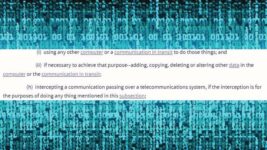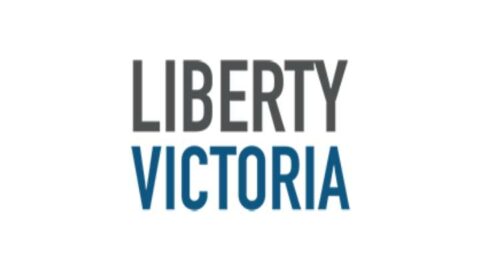A Constant Erosion of Citizens’ Rights: An Interview With Liberty Victoria’s Michael Stanton

Rights, or our lack thereof them, have become an increasing concern over the last three years of Morrison’s governance.
Most overtly we saw the extreme curtailing of freedoms with the lockdowns and restrictions used as a means to prevent COVID-19 transmission, as questions were raised as to whether the government had the power to impose them. People rioted in the streets. Most of this has passed.
Another key rights issue has been the Morrison government’s attempt to enact laws that would prioritise religious freedom above all other rights. Contained in the same bill which holds needed religious antidiscrimination guarantees, the Coalition tried to pass the whole swag off as protections.
Then there are the questions about the nation further straying away from any resemblance of a democracy, as we’re told we’re going nuclear in the form of submarines, we’re suddenly a part of the new AUKUS pact, and an upcoming war with China is imminent. No one voted for any of this.
But the Morrison government was voted in on the promise of establishing a federal anticorruption body. And while it’s increasingly clear why the PM has avoided doing this, it again triggers questions about the rights of the constituency to see its wants fulfilled.
The Orwellian Age
A key way in which both sides of government have been eroding our liberties over the last two decades, has been the fear of terrorism and the passing of laws to curb it, which have actually encroached upon the rights of us all.
And as it’s become increasingly apparent that there is no ISIS Australia about to jump out from behind the curtain, and the real terrorists amongst us are Anglos shrouded in Union Jack flags, the spruiking of surveillance state laws has shifted towards national security.
Indeed, when he was Home Affairs minister, Dutton pulled out some beauties. In the 2018 TOLA Act and the 2021 Identify and Disrupt Bill, he gifted various law enforcement and spying agencies the ability to “add, copy, delete or alter” data on citizens’ electronic devices and online accounts.
While new head of Home Affairs Karen Andrews has introduced her CROM Bill, which enhances the ability of foreign spying agencies to surveil Australian citizens and residents, as government increasingly whittles away at the onshore/offshore distinction.
Guarding against erosion
Liberty Victoria has long been keeping a keen eye on the encroachment of government upon citizens’ rights. And it’s been advocating for the establishment of a federal charter of rights that would help dismantle the ever-creeping surveillance state.
The civil liberties organisation was also one of the Victorian rights organisations involved in running the COVID Policing in Australia site, which many Australians turned to as a beacon of light when the draconian law enforcement was rolled out, instead of an enhanced health approach.
Sydney Criminal Lawyers spoke to Liberty Victoria president Michael Stanton about the tattered state of civil liberties at present, his concerns that surveilling and a lack of privacy are becoming the new norm, and why Morrison should have delivered a bill that upheld all rights.

Concerns around civil liberties and their erosion have been a growing focus since the current PM has taken power.
Michael, broadly speaking, how would you say Australians civil liberties have fared under the Morrison government?
It’s a concerning time for civil liberties across Australia. Not only federally, but also, in terms of state governments, and, in some cases, it cuts across party lines.
There’s an increasing authoritarianism that’s shared by both sides of politics and a continuing deference to the politics of national security and surveillance. This should be a concern for all.
In some respects, it’s the small “l” liberal voices that aren’t cutting through or have had limited opportunity to cut through.
There have been some noble exceptions to that recently. But, in Australian politics, that traditional small “l” liberal rule of law voice isn’t finding much amplification.
This is in particular when looking at the suite of national security laws, surveillance laws, new data disruption laws, and interference with and editing of data laws.
So, we do seem to be in an environment where both federally, and at the state level, our civil liberties are being continually eroded.
Liberty Victoria was one of the rights organisations involved with the much-lauded COVID-19 Policing in Australia site, which ran during the initial stages of the pandemic.
Civil liberties advocates often warn that once authorities are provided with more powers, it’s near impossible to roll them back
So, how do you consider what happened with law enforcement during the intense periods of the pandemic? And are we facing a situation now, where those temporary measures have gained some form of permanency?
We were a part of that website. And we should give a shout out to Flemington and Kensington Community Legal Centre, who took a lead in relation to that project.
We saw through the pandemic an overreliance on policing and a very harsh implementation of those emergency provisions, with a result that some fines were unfairly issued in an arbitrary way.
That’s always concerning, because it immediately raises issues of it affecting minority groups and people from lower socioeconomic backgrounds in a way that it doesn’t affect the top end of town.
So, a lot of those fines in Victoria – millions and millions of dollars of fines – remain unpaid.
The fines, of course, were vast. They started off at around $1,600 and then for some protest activities and gatherings, they ended up becoming over $5,000 for individuals, which is just prohibitive.
Then there’s the increasing reliance on militaristic responses to things like protests.
Even though we might not have shared some of the political views of the people protesting, whenever the police are using kettling techniques, pepper rounds, capsicum seed foam or stun grenades, that’s an obvious concern because it can become normalised as a protest response.
Even if you don’t agree with those protesting, if you don’t speak up, then it becomes the new normal for everyone when they protest.
There are still cases going through the courts in relation to that time. In particular, the charging and use of the offence of incitement, which had been rarely used in the past.
There were cases of incitement to murder. So, obtaining a hitman, who turned out to be an undercover police officer and asking them to put a hit on someone.
But really it was very rarely charged. So, for that to become a normalised charge for these purported protest organisers is a worry. It’s adopting a harsh criminal response to people exercising freedom of expression.
Victorian police use some of their harsher weapons for the first time over that period. So, do you consider it’s more likely they’ll pull them out again?
Once it’s used it becomes easier to use again because it becomes a normalised response. But I’m not saying the police, in some of those protests, had an easy job.
We saw some of the scenes of protestors breaking police cordons. There was the protest outside of the CFMEU. We saw concerning elements amongst some of these protesters, in particular from the extreme right.
Those protests became a means for the re-emergence of the far-right. Liberty Victoria is very concerned about the return of these extremist elements.
We’re not saying police had an easy job. But equally there were examples of people being fined in what would appear to be unfair circumstances, and people being charged when it was questionable given the circumstances.
So, is it really a proportionate response to drag someone through the court system for organising a protest where not many people even turned up? It’s an overreach, which can then become normalised.
But we saw the police fine people across the political spectrum. There was the example of the protest outside the hotel in Preston.
It was a car cavalcade to keep the protest socially distanced, but the participants got fines. They were protesting the treatment of the refugees detained in the hotel.
We saw protesters demonstrating against the destruction of First Nations culturally significant trees fined these vast amounts.
So, these massive fines cut across the political divide, and then later, there were the more militaristic police responses that were of concern.
Especially, the use of kettling by police, where they encircle a group of protesters and close in on them. This would seem to be the opposite of socially distant policing. They were actually confining people into smaller spaces.
And when police are firing rounds – whether that’s lethal or nonlethal – it’s a concern because accidents can happen. Even tragedies can happen with pepper ball rounds.
The huge amount of national security-counterterrorism legislation that’s been rolled out over the last two decades has now surpassed 90 bills.
Some of Dutton’s, such as the TOLA Act, the ASIO Amendment and the Integrity and Disrupt Bill are draconian in the extreme.
Then there’s the new Andrew’s Bill – the Comprehensive Review and Other Measures No 1 – which extends the reach of foreign spying agencies domestically.
What are your thoughts on where all these laws are taking us?
The suite of national security laws ever since September 11 2001 has been unrelenting. There has been this continual increase in the powers of the executive in relation to national security and surveillance.
It’s a worry. Liberty Victoria strongly believes that people have the right to privacy – the right to be left alone.
Often, in relation to the more authoritarian elements of these laws, governments trot out that if you have nothing to hide, then you have nothing to fear. But people shouldn’t be under surveillance as a norm.
This shouldn’t become normalised. Just being under surveillance creates a stigma that you’re being watched, and you should be watched because there are criminal elements amongst you.
Therefore, it’s in everyone’s interest that everyone is watched all of the time. In a perfectly safe state, perhaps, everyone would be watched 100 percent of the time and there would be CCTV everywhere all of the time and you couldn’t get away from it.
We don’t want to live in a society like that. It’s not an environment where we want people to be. People should be trusted to get on with their lives in privacy and be good citizens without being constantly checked on by the state.
So, we’re concerned about this normalisation of surveillance, and part of it is social media culture. Increasingly, the older and the younger generation are all on Facebook or Instagram and other platforms, so people are used to not having privacy and putting themselves out there.
Notwithstanding that their data is being harvested –often for profit – it’s now a normal part of people’s lives to not have privacy. And that’s a concern. Just that fundamental right to be left alone is being continually whittled away.
This is particularly in relation to terrorism and national security. We’re concerned about the emergence of the far-right, and there’s an inquiry about to happen in Victoria in relation to the emergence of it.
We’ve seen those images of the Nazi-affiliated men in the Grampians doing Nazi salutes. They’re confronting images for people, especially if they’re from a minority group.
Our concern is there’s been an overpolicing of the Muslim community in Australia for a long time. And this had been at the cost of properly looking at the emergence of the far-right.
We’ve now seen Christchurch and how close to home this is. An Australian perpetrated that massacre.
It just takes one person. So, whilst the national security apparatus was focused on the Muslim community, there has been the emergence of this extreme far-right.
Again, part of this is linked to social media culture. Everyone is in their own bubble. People find like-minded individuals much easier than they could have before there was social media and online groups.
So, people can gravitate to each other and take the filter off in a manner that they couldn’t previously in the public square. So, it does result in this festering and emergence of far-right politics.
We don’t know why certain people gravitate towards extreme actions. It’s not as simple as saying it’s just a problem in society and they’re gravitating towards these ideologies, because they feel alienated, disaffected and not listened to.
There are a lot of conspiracy theorists out there, and with COVID we’ve seen an escalation. So, social media results in the amplification of conspiracy theories, and it’s being weaponised by the far-right. We’re very concerned about that.
This creates a difficulty because security agencies need to have enough power to monitor what’s going on. But, at the same time, we want to make sure that they don’t overuse these powers.
There needs to be proper judicial oversight to ensure these laws are only used in extraordinary circumstances where they’re justified. So, it’s a difficult balancing exercise.
The other thing to say is, we don’t know why people transcend from extremist ideologies into action.
There is decades-worth of scholarship about this. While a lot of people are exposed to extremist ideas every day, it’s only a tiny fraction that ever takes the next horrific step to violence.
The experts can’t predict who is going to be the person to go from exposure to ideology and into action.
But a lot of the legislation we’ve been discussing is premised on the conveyor belt idea, where it’s an inevitability that once you’re exposed to an extremist idea you will progressive to violence. These laws see it as an inevitable stepping stone.
So, some of the powers that we have seen in Victoria in relation to deradicalisation presume that, but the scholarship just doesn’t bear it out.
So, whilst we need law enforcement and security agencies to have some sort of power for extraordinary circumstances, we have to be careful when it comes to censorship in this respect, because, frankly, censoring doesn’t stop rogue actors.
The focus needs to be on particular people who pose a particular risk in extraordinary circumstances.
It should not be the monitoring of entire social groups, like the Muslim community, on the assumption that some members could be on that conveyor belt to extreme action, because it’s just not true.
You’re referring to the sorts of laws that now allow for the inquiring into or questioning of individuals, simply because they know someone from an organisation, or they might be an associate of one.
And this is regardless of whether they’ve shown any indication that they might be up to something.
Yeah. Victoria has passed deradicalisation legislation, which allows people to be placed on orders prior to having taken any proactive steps towards violence.
You can understand why government thinks it’s a good idea. They want to act early. They want to get in fast and put them on these orders to deradicalise them at an early stage.
But the problem that we see immediately is that these laws are overused. You have young men in the community who are angry and upset and do have some exposure to some pretty noxious ideology, and then they’re put on an order. And if they breach it, it results in criminal sanctions.
So, it’s a serious thing. It’s a huge invasion of privacy. It’s a huge imposition on people.
The underlying assumption that there’s this conveyor belt and someone who is exposed to far-right or ISIS ideology will immediately be on a path to becoming a domestic terrorist or an enemy combatant, just isn’t born out in the literature.
You can’t profile who is going to take that next step. So, whenever you have these extraordinary powers, it can result in people getting swept up into a system, which can then result in criminal penalties and a deprivation of liberty. We have to be so careful.
These powers can be overused, and they can be used to target people in ways without acknowledging where the real problem is.
An example is the myopic focus on the Muslim community over the last 20 years, at the expense of looking at and addressing the far-right.
Whenever you have these extraordinary powers, they can be deployed in an unfair manner and in a way that doesn’t actually address the real risk.
People are increasingly commenting on corruption in relation to the Morrison government. There have been multiple pork barrelling scandals, questionable press raids, and political prosecutions. And their promised federal anticorruption watchdog is nowhere to be seen.
How much of a change would an anticorruption body make? And do you think Labor would come through with the goods if elected?
This government committed to a federal anticorruption commission, and they never introduced the bill. They say they showed the opposition, and they wouldn’t agree.
But they should have put their money where their mouth is and introduced it. If it was voted down, they should have worn that.
It was a commitment to the electorate that they would establish a federal anticorruption commission.
Labor has said they are committed. That’s a good step because there should be one.
But there are concerns whenever you have a body with such significant powers, including compulsion, where witnesses may not have freedom from self-incrimination. So, you need to be careful with those bodies, and they need to exercise their powers with great care.
We’ve seen some overreach examples in state bodies.
So, on one hand, you can understand some of the concerns, but, on the other, it seems extraordinary that there isn’t a federal anticorruption body given the role of lobbyists in politics, the role of donations, and given examples such as blind trust accounts where no one apparently knows who the donors are for a minister’s legal expenses.
These are extraordinary circumstances, and they fail the sniff test pretty easily. The time has come for there to be a robust federal corruption commission that exercises its powers carefully and diligently.
There are also concerns about some of the rhetoric that was used around the NSW anticorruption commission.
The federal government effectively said that the inquiry in relation to the Berejiklian government and her actions was just a witch hunt at a time when the government seemed to also want her to run for preselection to stand for the Liberals federally.
That’s concerning. Just as we shouldn’t have a politicisation around national security, we shouldn’t have a politicisation around anticorruption bodies that ensure that our governments are operating with integrity, because it’s an easy political hit for governments.
Politicians know these bodies have a limited capacity to respond. A similar thing happens with attacks on the judiciary.
You have politicians attacking judges for particular outcomes or sentences, knowing that the judiciary has one arm, if not both arms, tied behind its back and won’t engage publicly in that kind of debate.
While Morrison failed on his promise to deliver the federal corruption watchdog, he didn’t let up on pushing for the Religious Discrimination Bill, which was only shelved because other MPs wanted current discriminatory laws revoked.
Why is the federal government attempting to undermine antidiscrimination laws in general? And do you consider we’ve seen the last of this agenda?
It’s not the end. We’ve seen a schism in the Coalition, and in the Liberals in particular, in relation to the Religious Discrimination Bill, and, unfortunately for Morrison, it seems no one is happy.
You’ve got the conservatives in the Coalition, who are unhappy this bill didn’t go through. You’ve got the moderates, who are unhappy it got to this point and there could have been this level of discrimination towards LGBTIQ people.
Equally, there are moderates in the Liberal Party, who are concerned about these teal independents that are now echoing what used to be the moderate Liberal line.
The teal independents are occupying this space where they want a federal anticorruption commission. They want to treat asylum seekers and refugees fairly. And they’re committed to action on climate.
These independents are taking the moderate small “l” liberal voice that did used to have a home with some Liberals, whether that was with Turnbull or Petro Georgiou back in the day.
That is a real issue for the Coalition in relation to this schism.
The Religious Discrimination Bill was an overreach in a massive way. And it’s a good thing it has been parked for now.
But it will emerge again at some point, because the hard right of the Coalition will push for that prioritisation of religious freedom above all other freedoms.
That leads me into my last question, Michael. Antidiscrimination experts agree that religious protections are needed in law, but, as you point out, the Religious Discrimination Bill raises religious liberty to a point where it sits above all other rights.
Liberty Victoria advocates for a federal bill of rights that would enshrine all liberties and freedoms in law at the national level. So, why is this the way to go?
Our point is that the best way to have a balancing of human rights, and to protect religious freedom as one of those rights, is to have a federal charter of rights.
Australia is the only western democracy without a federal bill of rights. Now, we shouldn’t be prioritising religious freedom above all other rights, and that’s what Morrison’s bill does, it prioritises one human right above all others.
What would be much better would be to have a comprehensive framework that protects all human rights recognised in international law.
That would include freedom of religion, and it would also include the right to privacy, freedom from discrimination, and freedom of movement.
A charter of rights is a comprehensive instrument. Often human rights can be in conflict. Human rights jurisprudence internationally has developed a long way in balancing competing rights.
Classically, you’ve got freedom from discrimination versus freedom of expression. These rights can butt up against each other.
So, human rights instruments should protect all fundamental human rights, and then ensure that there’s a proper balancing of human rights.
So, apart from some non derogable rights, such as the right to life and freedom from torture, other rights can be limited.
Freedom of expression can be limited. I don’t have a right to incite someone to commit violence or consume child abuse material.
Obviously, there are limits to freedom of expression and we put limits on that all the time. Equally, with the right to privacy.
When you’re on the road, you know you might be surveilled by a speed camera, and most people consider that to be fair enough because you want people to be safe on the roads and it’s a legitimate measure we take to this end.
People, particularly the LGBTIQ community, especially young trans people, shouldn’t become part of a political game leading into an election, where their rights are trampled upon because one political party wants to strengthen its support with a section of the community.
That’s what happened with the debate around the Religious Discrimination Bill.
We know how difficult it is for young trans people and the high level of self-harm. So, for them to become so politicised in the leadup to an election takes a great toll, and we saw that in a similar manner with the queer community in relation to the marriage equality debate.
So, there should not be a law that allows one right, such as religious freedom, to trump all others.
There is a delicate balance, where rights that come into conflict need to be weighed and balanced without prioritising one above the other, and that’s what a federal bill of rights would do.








